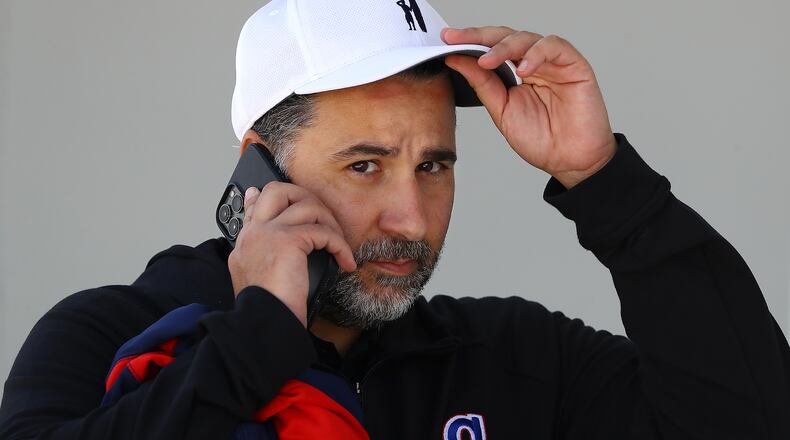The Braves have the National League’s best record and run differential. They lead the league in runs scored per game. That’s with lackluster production from the reigning NL Rookie of the Year and All-Star third baseman. The Braves are second in runs allowed. That’s despite their ace pitcher being out for two months.
The Braves feel inevitable at the season’s midpoint. There’s no sense that anything can stop them other than the usual variable, bad injury luck, and they’ve already had plenty of that. The Braves have been that much better than the rest of the National League. There’s no reason to think they’ll slow down.
That’s wild when you think about the preseason expectations. The Braves were supposed to be good, but not this good.
On opening day, bookmakers gave the Braves slightly shorter odds to win the NL East than the Mets, who spent big money to keep up. The Mets are 17-1/2 games behind the Braves in the East (all records and statistics before Thursday’s games). In March, the Braves and Dodgers had about the same betting odds to win the NL. Now, the Braves are clear favorites over the Dodgers with implied odds of 40% to win the pennant compared with 30% for L.A.
The Braves (53-27) are 6-1/2 games ahead of second-place Miami in the NL East. They are 5-1/2 games ahead of the Diamondbacks for the NL lead. The gap is larger than that by every other measure. The Braves have a plus-117 run differential. The Dodgers are next-best in the NL at plus-51. The Marlins are minus-two, and the Diamondbacks are plus-39.
Pretty much every cause for concern for the Braves in the preseason had evaporated by May. We’re to the point of the season where surprisingly hot starts for players have become the baseline expectation.
Who could know that shortstop Orlando Arcia could be much better than he was in 2017, which is the only time he’d been a solid everyday player? Raise your hand if you predicted Bryce Elder would have an NL-best 2.44 ERA after 16 starts. No one could foresee that both Eddie Rosario and Marcell Ozuna would provide above-average production at the plate.
Alex Anthopoulos might be the exception. The Braves’ general manager stuck with Arcia after Dansby Swanson walked in free agency, then signed him to a contract extension in April that’s looking like a bargain. Anthopoulos rolled the dice that Rosario and Ozuna would regain their form. To fill the fifth rotation spot, Anthopoulos relied on organizational depth rather than acquire a veteran and Elder came through.
The Braves have no major holes that need to be patched at the trading deadline, but if there’s a move that improves the roster at the margins then chances are Anthopoulos will find it. Nearly every move he makes works out. So many things go right that it doesn’t matter much when things go wrong.
Third baseman Austin Riley is scuffling by his standards, but it hardly matters because Arcia is having a career year. Michael Harris II was one of MLB’s least productive hitters through May. No problem: Sean Murphy, acquired in a December trade, is hitting like he never has before. Ace lefty Max Fried has been out injured so, naturally, Elder is performing like an All-Star.
Fried’s pending return is one of many reasons to believe the Braves will keep rolling. Several other key players have spent three weeks or longer on the injured list: Kyle Wright, Arcia, Harris and closer Raisel Iglesias. The Braves are owed better injury luck. It doesn’t always even out, but it might.
At this point, the Braves would have to suffer a total collapse to not earn at least one of the three NL wild-card berths. The major statistical projections agree that there’s a slim chance of that happening.
FanGraphs’s model gives the Braves a 99.9% chance of making the playoffs. FiveThirtyEight.com concurs. Even Baseball Prospectus has come around on the Braves. Its PEOCTA projection has been a weird outlier among Braves forecasts in recent years, but now it puts their chances of making the playoffs at 99.8%.
The bullish outlook for the Braves is in part because their NL East foes are no match. That was one reason to be skeptical of the Braves at the end of May. I wasn’t among the doubters. The Braves weren’t just beating division opponents; they were dominating them. Since then, the Braves have won 19 of 23 games with win streaks of eight, seven and five games (and counting).
The Mets got swept in three games here this month after leading all of them. They’ve lost 11 of 17 games since then. The Marlins are, surprisingly, not that bad. Yet they’ve lost six of seven games to the Braves by a combined score of 54-22. The Phillies are 10-1/2 games back and have had three losing streaks longer than the Braves’ season high of four.
The East has become an afterthought for the Braves. The real threats are elsewhere. Beware of the Dodgers. Their recent history has been to follow incredible regular seasons with October flops. This year the Dodgers are kind of chugging along while waiting for their pitching staff to get healthy. I get the feeling they’ll be peaking for the postseason.
The Braves and Dodgers are the class of the NL. That doesn’t guarantee anything, of course. The Dodgers and Braves finished one-two in the NL last season. Both were one-and-done in October. Nothing is guaranteed in the postseason, where randomness can undermine the best teams.
What’s clear at the end of June is the Braves are the class of the NL.
About the Author
The Latest
Featured


